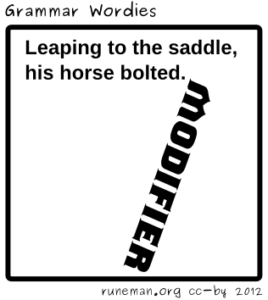 Indies Unlimited has all kinds of editing resources for writers. We even have real-life editors who take a spot at the gruel pot.
Indies Unlimited has all kinds of editing resources for writers. We even have real-life editors who take a spot at the gruel pot.
Because I am not an editor, while I’m reading a novel that interests me, the occasional typo or misplaced modifier is likely to fly right past me. In spite of that, I’m a writing tutor for Pearson/Smarthinking. It’s okay. I can pay attention when I have to.
I tutor over 100 students per month on higher-level orders such as thesis statements, content development, and organization. I also coach them on lower-level issues such as noun-verb agreement, sentence structure, and misplaced modifiers.
Over time, I’ve come to see the same lower-level mistakes again and again. Some are so sneaky that we can read a passage, know something isn’t quite right, but have no idea what it is.
Here are some of the sneakiest errors I see:
1. Misplaced or dangling modifiers. Without getting complicated, a modifier is a word, clause, or phrase that modifies (changes, clarifies, enhances, describes) another word, clause, or phrase in the sentence.
Groucho Marx (as Captain Spaulding in the film Animal Crackers, 1930) is often quoted as having one of the most humorous misplaced modifiers:
“One morni ng I shot an elephant in my pajamas. How he got into my pajamas I’ll never know.”
ng I shot an elephant in my pajamas. How he got into my pajamas I’ll never know.”
Obviously, Mr. Marx meant he was in his pajamas when he shot an elephant, but you wouldn’t know that from the sentence.
We laugh at misplaced modifiers in headlines. Years ago, I read in my hometown newspaper that a young boy discovered a skull walking in the woods. I doubt that’s exactly the way it happened.
Most misplaced modifiers I come across aren’t as hilarious, but can still be confusing. For example, sentences such as, “She awakened to the sun in her four-poster bed.” Sounds a little uncomfortable, doesn’t it?
Watch those modifiers. They have a tendency to wreak havoc. (But feel free to share funny ones in the comments.)
2. Fewer versus less. For some reason, this is a pet peeve of mine. A few weeks ago I accompanied my son to a doctor’s appointment where I heard him say, “I used the bone stimulator less times last week.” I bit my tongue, but my son (what a good kid!) turned to me a minute or so later and said, “I know. I should have said ‘fewer.’ It probably killed you, didn’t it?”
It nearly did, and he was right. He should have said “fewer.” In general (I’m sure there’s an exception to the rule out there somewhere), if you can count it, it’s fewer. If you can’t count it, use “less.” Less time (but fewer times), less water (but fewer ounces), less money (but fewer book sales).
I don’t like that last example. I should have listed fewer examples, and taken up less of your time.
3. Well versus good. This one is more complicated, because there are exceptions. To keep it simple, we’ll ignore the exceptions.
In general, “good” is an adjective (modifies a noun), and “well” is an adverb (modifies a verb). So, you would say, “I did well [adverb modifying the verb did] on my exams,” or, you could say, “I did a good job on my exams” [adjective, modifying the noun job].
You could also say, “Melinda, do a gooder job of explaining things.” But that would be wrong on so many levels.
4. Parallel structure. Language is a beautiful thing. At its best, it has a rhythm. Think of Shakespeare’s Julius Caesar:
“Friends, Romans, Countrymen, lend me your ears;
I come to bury Caesar, not to praise him.”
Do you feel the rhythm in that? It flows. That’s parallel structure.
But how about this: “She tied her shoes, then stood up, and then left the room.” It’s not incorrect, exactly, but it doesn’t flow. “She tied her shoes, stood up, and left the room.” That’s better (unless you’re not a fan of the Oxford comma).
I see a lack of parallel structure all the time, and while I can’t ding it for being wrong, I can tell the student their writing would flow more smoothly if they used it.
Another example: “She gazed into his eyes, placed her hands on the back of his neck, and then began pulling him in for a kiss.”
If you’re going to use past tense, use it all the way through the series.
“She gazed into his eyes, placed her hands on the back of his neck, and pulled him in for a kiss.”
And I don’t even write romance!
That’s it for this time, but I’m sure I’ll discuss more in the future. For now, has anyone seen any hilarious misplaced modifiers?

I saw one a while back (can’t even remember where):
Walking down the street, the trees were aflame with color.
LOL! I’ve seen lists of them passed around on social media before, but of course couldn’t find them when I went looking.
The example Melissa gives is a double whammy. I see so many people nowadays using the “-ing” verb at the beginning of a sentence, but then putting the wrong noun after it. “Consciousness fading away, the world turned black.” The world’s consciousness did not fade away. You need “As his consciousness faded away, the world turned black.”
That sort of structure is really common – too common. I see those types of errors all the time.
*Night moving in quickly, the computer was turned off.* 😉
Good post, Melinda.
I don’t know why the misplaced (or dangling) modifier can be so hard to explain. In 2008-2010 I worked with a couple and their daughter on an on-line weekly magazine.
I ended up doing the subbing (sub-editing) for them because that was what I’d done in a previous lifetime.
The misplaced modifier was the most frequent fault I picked up. I used to explain it to them in the plainest ways using examples similar to your and Melissa’s. They never got it.
– Paul Corrigan
Thanks, Paul! I find them hard to explain. At first glance, people often don’t see what’s wrong. When I try to explain that the modifier isn’t modifying anything, or is modifying the wrong thing, I tend to get blank stares.
Yes, well put, and with some humour, even. That last example is one I see often.
Thanks, Yvonne! 🙂
Just so I can laugh at myself …
From my first novel, and I knew the sentence was awful but I could never seem to get around it: ‘The parade in Red Square was huge and impressively theatrical – soldiers by the thousand goose-stepping and arm-swinging as one to strident martial music; proud old men and women veterans weighted down with their medals clutching flowers borne on war-era trucks; ….’
– Paul Corrigan
It took me quite a while to see the problem! Maybe, “weighted down with their medals while clutching flowers” would work?
You’re much braver than I am. I’m not going back to look at mine. No, sir!
Thank you for repositioning the misplaced modifiers for us, nice job.
LOL, you’re welcome, Allen. 🙂
Made me giggle. Thank you!
Thanks for stopping by!
Misplaced modifiers: There are so many hilarious ones I’ve seen over the years.
The one that sticks out most in my mind was in a book called “Silly Signs”. It read: “Cane lost by man with a curiously carved head.”
Ha! Thank you for that – I literally laughed out loud!
I remember seeing this headline in a local newspaper:
– Girl in horse-riding accident upgraded to stable.
And this from a daytime drama:
– “Lies! Lies! What else can they be, if you’re not telling the truth!”
That first one is terrible – but funny!
Thank you so much for the clear (and humorous) explanation, Melinda. I must confess that I still pick them up in my own writing from time to time! But funny examples help me to remember:>)
I do, too, Karen, all the time. It’s so easy to leave a modifier dangling! Thanks for stopping by. 🙂